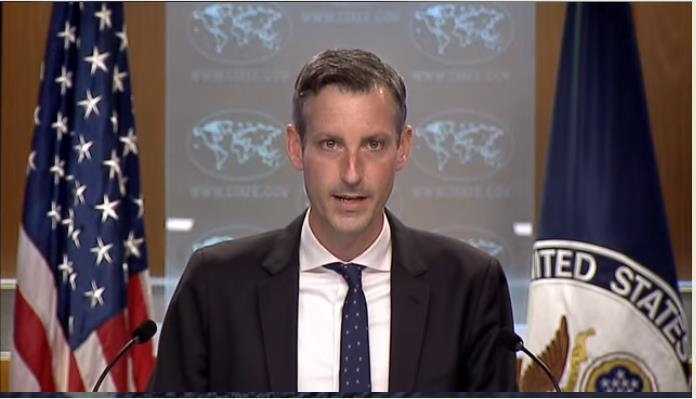 |
The image captured from the website of the US Department of State shows spokesman Ned Price answering questions in a press briefing at the State Department in Washington on Wednesday. (US Department of State) |
WASHINGTON -- The United States seeks to engage with North Korea diplomatically to make progress toward the denuclearization of the Korean Peninsula, a State Department spokesman said Wednesday.
Ned Price also said the newly appointed special US representative for North Korea, Sung Kim, will continue to work toward that end.
"So the policy that we have spoken to calls for what we have deemed a calibrated, practical approach, that explores diplomacy, that is predicated on diplomacy with the DPRK to make tangible progress, that increases the security for our people, for our allies in the region, as well as for deployed forces," the department spokesman said in a press briefing, referring to the new US policy toward North Korea.
DPRK stands for the Democratic People's Republic of Korea, the North's official name.
"And we did announce that Ambassador Sung Kim will serve as the special representative for the DPRK, and Ambassador Kim will, for our part, continue to be deeply engaged in this, and will be heading our efforts to explore that practical, principled diplomacy to make progress where we can," Price added.
President Joe Biden announced his appointment of Kim at his joint press conference with South Korean President Moon Jae-in after their bilateral summit in Washington on May 21.
Kim, US ambassador to Indonesia, will concurrently serve as a special envoy for DPRK for the time being, the State Department has said.
The US concluded its monthslong review of its policy toward the North in April.
Officials here have said the US has since reached out to Pyongyang to explain the outcome of its North Korea policy.
North Korea remains unresponsive to US overtures, which include an outreach in February.
Price said he had no "updates" to share on any North Korean response.
"But we have focused our efforts on consulting closely with our allies and with our partners, knowing that this is a challenge that we can't address alone, that if we are going to make demonstrable progress that we seek to make in the context of our own security, in the context of the security for our treaty allies and for our deployed forces -- something we need to tackle together with our allies and partners in the region," he said. (Yonhap)





![[Exclusive] Hyundai Mobis eyes closer ties with BYD](http://res.heraldm.com/phpwas/restmb_idxmake.php?idx=644&simg=/content/image/2024/11/25/20241125050044_0.jpg)
![[Herald Review] 'Gangnam B-Side' combines social realism with masterful suspense, performance](http://res.heraldm.com/phpwas/restmb_idxmake.php?idx=644&simg=/content/image/2024/11/25/20241125050072_0.jpg)

